It’s amazing to me how much excitement we have in this far removed corner of the world. A couple nights ago, we got word that a lady had come to the mission to be seen for some injuries from a fall. I went down to find the lady waiting outside the mission gate with a crowd of people around her. Her family had carried her to us on a box-spring mattress-turned-stretcher with two long pieces of wood for handles. Her right leg had an open fracture, her collarbone was broken and I could see bone through the laceration on her head. It turned out that she hadn’t fallen; she’d had an avalanche of rocks fall on her. I learned that when people are working in their garden digging for yams, they dig deep holes and put rocks they find (some the size of small boulders) around the perimeter of the hole. David says that every year he’ll hear of people being killed or seriously injured when the rocks fall back down into the hole on top of people, and yet they continue to do it. It had taken her family a few hours to get her to us, walking part of the several miles, and catching a ride part of the way, so by the time she got here she at least had stopped bleeding. I got to work cleaning and covering the wounds and loading her up with antibiotics what little pain medication we have, while David made arrangements for his son, Josh, to drive her down the mountain to Cayes and the nearest hospital.
Another story I included in one of my emails but haven’t gotten around to putting on this blog happened a few weeks ago. A lady came to us just as we were finishing up work for the day. She had been pregnant but didn’t think the baby was due quite yet, so she walked about 9 miles to the market that morning. On the way home, she had walked about 2 miles, and then went into labor. The way she described it, the baby just slid out right away and passer-by’s helped cut the cord. This baby was very small and had a cleft palate as well as what looked like other neurological problems. So this dear lady walked another 3 miles to where we’re living for us to take a quick look at the child. She only stayed for a few minutes and then wanted to go home before it got dark.

She would have walked (another 3 miles on the main dirt road and another mile on a slippery mud foot path) but a neighbor volunteered to take her by motorcycle.

Of course I had to take a picture of this lady who had just given birth, walked three miles, was dealing with the shock of a child with serious deformities and was now straddling a motorcycle on a bumpy dirt road with her newborn in her arms! I visited the lady the next day and was really impressed with the way she was coping and caring for this baby in a culture where it would not be unheard of to call the baby a devil-child and throw it out to die. We ended up sending the baby down to the hospital for surgery to repair the cleft palate because he couldn’t have survived in these conditions as he was. I’m so grateful for the ability to send our critical patients to the hospital! It’s shocking how bad things can get for people when they can’t get any medical care because they can’t afford it.
On the whole I’m still doing really well out here. Every morning and into the afternoon I work with a Haitian girl named Jacqueline, who’s had training here in Haiti as a lab tech, and more recently, an American doctor spent two months training her in medicine. We don’t have an official ‘clinic’ here, but we usually see an average of 25 people every day anyway and as much to 40 people on a busy day. Jacqueline only speaks a couple words of English, but fortunately she’s smart enough to be able to figure out what I’m talking about as I butcher Creole. Our communication usually works with the patient explaining their symptoms in rapid paragraphs of Creole, Jacqueline simplifying it for me in Creole, my explaining treatment and medication in what must be pretty sad Creole from the looks that I get, and Jacqueline explaining to the patient what I’ve said so that they can understand it. It’s a little humbling when my Creole has to be re-translated, but I’ve only been here for two months so I guess I’ll need to have a little more patience. Fortunately, for the more complicated communication issues, David is often around and willing to translate. A lot of the people come for common complaints: headache, heartburn, a lot of asthma, simple infections or wound-care, etc., but every so often we do have more serious cases, like the one mentioned above, carried through the gate.

I’ve also gotten to spend a good amount of time getting to know people in the community. I love going for walks and visiting people at their homes. With few exceptions, living conditions in rural Haiti have improved very little over the past centuries. I took these pictures when I went to visit a man who works here at the mission when he was sick a couple days ago.


On the way up to his house, we passed a few kids heading down to the mission for the feeding program.

This is his mother-in-law as I found her when I walked up to the house, sweeping the yard. For pain, Haitians tend to tie tourniquets around the area that’s giving them grief. Sometimes the tourniquets will be simply strips of cloth, other times they’ll create a home-remedy compress of leaves, dirt and often more disturbing ingredients, and then tie the tourniquet over the compress.

TiPelon had been having pain in his ribs so this is the compress that his mother-in-law had tied over them. It could’ve been worse, TiPelon is doing much better now.
Tomorrow, Steven will be going down to Cayes to get a letter from the hospital saying that the surgery he needs is one that can’t be provided in Haiti. That’ll be one step closer to getting him to the States!
 Every morning Mita waits under a tree for me to bring bottles of formula for her to carry back to her house and baby brother, Kendy. Her mom has 7 children and 'shares' a man with another woman so the result is that neither of the man's families are adequately cared for and the mom isn't sufficiently nourished to provide milk for her baby.
Every morning Mita waits under a tree for me to bring bottles of formula for her to carry back to her house and baby brother, Kendy. Her mom has 7 children and 'shares' a man with another woman so the result is that neither of the man's families are adequately cared for and the mom isn't sufficiently nourished to provide milk for her baby.  This is their home, a single-room dwelling with the bed in the back partitioned off with a hanging sheet. In the middle of the house is a circle of rocks, used to hold a cooking pot off the ground over a fire. The baby sleeps in the bed with his mom, the rest of the children sleep on the ground.
This is their home, a single-room dwelling with the bed in the back partitioned off with a hanging sheet. In the middle of the house is a circle of rocks, used to hold a cooking pot off the ground over a fire. The baby sleeps in the bed with his mom, the rest of the children sleep on the ground. Several weeks ago, when Kendy was about two weeks old, his mother first brought him to us and told us about her inability to feed him. The baby had been subsiding on sugar water and was pretty pathetic looking. Over the last few weeks he has grown wonderfully and looks to be a healthy, happy baby. When we leave, we'll hire someone to be in charge of preparing the bottles, as the mom's not able to clean the bottles and prepare the formula in a manner clean enough for a newborn.
Several weeks ago, when Kendy was about two weeks old, his mother first brought him to us and told us about her inability to feed him. The baby had been subsiding on sugar water and was pretty pathetic looking. Over the last few weeks he has grown wonderfully and looks to be a healthy, happy baby. When we leave, we'll hire someone to be in charge of preparing the bottles, as the mom's not able to clean the bottles and prepare the formula in a manner clean enough for a newborn.




















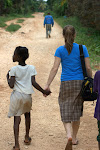.jpg)

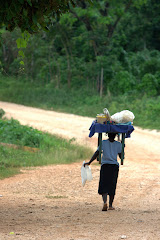.jpg)
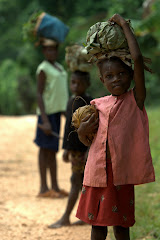.jpg)
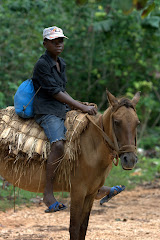.jpg)
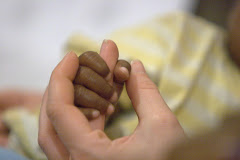.jpg)
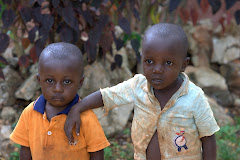.jpg)
